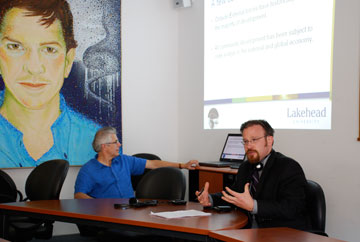CNS Members Explore Social Impacts of Forestry: Comparing Declining Industry in Canada and Finland to Boom in Uruguay
(December 21, 2010 – Thunder Bay, Ontario) Lakehead History Professors Drs. Michel Beaulieu and Ronald Harpelle, both members of the Lakehead University Centre for Northern Studies (CNS), attended an international seminar, meetings, and workshops in Montevideo, Uruguay from December 7 to 16. The goal of the conference was to discuss natural resource communities and forestry in Canada, Finland, and Uruguay.
The researchers are examining the social impact of a declining forest industry in Canada and Finland in the context of Uruguay's booming pulp industry. A number of forest industry giants are making or planning to make massive investments in Uruguay's pulp production and the plantations associated with it, which creates questions about what northern communities in Canada can learn from the experience of the industry's decline in Finland and the corresponding development of new single-industry resource communities elsewhere in the world.
"We want to look at how northern communities can adapt to the changes taking place and what role governments can and should play in this transition," says Dr. Beaulieu, noting the researchers' main priority in attending the conference was to explore community development and resilience in the global pulp and paper industry. Entitled La situación y perspectivas de la agroindustria forestal y celulósica en Canadá, Finlandia y Uruguay, the conference is the product of a SSHRC Research Development Initiative sponsored by the Facultad de Ciencias Sociales, Universidad de la República (Uruguay), and the CNS.
The December conference also included Lakehead's former Finnish Chair Hanna Snellman, as well as Dr. Thomas Dunk and Dr. Bruce Muirhead, former Lakehead faculty.
For approximately three years, Drs. Beaulieu and Harpelle, Dr. Chris Southcott (Sociology), and a network of researchers from other universities in Canada, Finland, and Uruguay, have examined resource development and the consequences and impacts arising from the growth of a thriving global forest industry. As Dr. Harpelle notes, "Today's forest industry in Northern Ontario faces challenges and is undergoing important changes, although neither are occurring in isolation." In May 2010, this network of researchers conducted the first international seminar in Thunder Bay under the sponsorship of Lakehead's CNS and the Canadian International Council.
Drs. Beaulieu and Harpelle also travelled to Uruguay as part of an AUCC-IDRC Canada-Latin America and Caribbean Research Exchange Grant, which supports small collaborative research activities that contribute to the creation, dissemination, and sustained application of knowledge. Dr. Beaulieu, Director of the CNS, explains that "By participating in these and other activities, members of the CNS are working to ensure that Lakehead's expertise in northern development research plays a significant role in the growing field of north-south collaborative international research, particularly in the southern cone region."
While in Uruguay, Drs. Beaulieu and Harpelle celebrated nineteen years of Canadian cooperation in the development of sustainable coastal development as guests at an event organized by the IDRC and the Canadian Embassy in Uruguay. Additionally, they presented the Facultad de Ciencias Sociales, Universidad de la República, with a collection of the CNS' publication series, met with students and faculty to strengthen the CNS' international links, and undertook fieldwork in the Uruguayan countryside.


